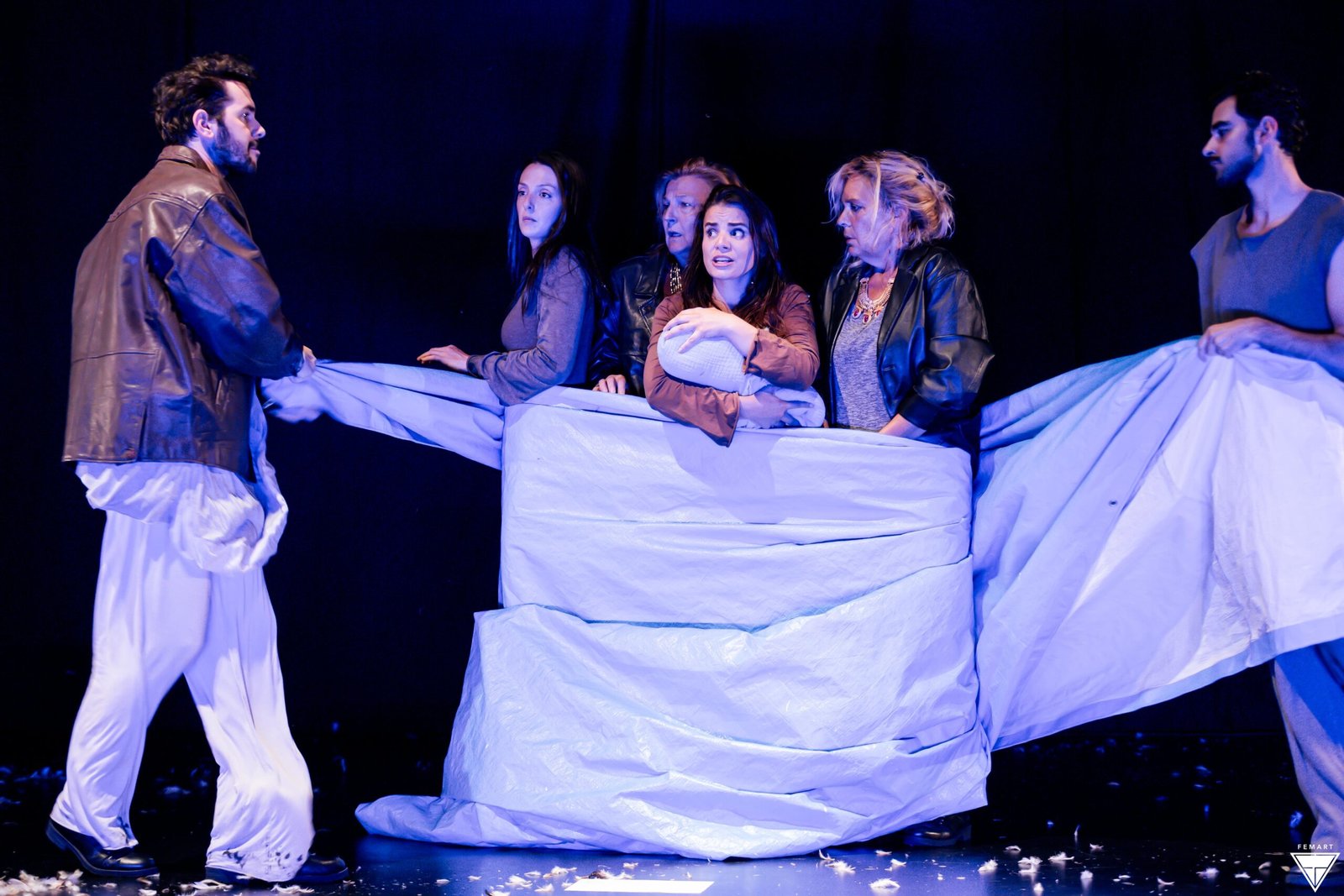By: Gili Hoxhaj
The long war of Troy is still discussed. But how often are women part of that discussion? If not throughout history, then in the play “The Women of Troy”—on the fifth night of the FemArt Festival—their voices were heard loud and clear, speaking in the first person. And not only the women of Troy, but all women who have endured war’s cruelty: the killing of their children, families, dreams, and love, the denial of their bodily autonomy.
The “Trojan Horse” was the deceit that led to the city’s fall. But in this play, it is the first to rise again—seemingly lifting entire new cities with it, where war once again takes center stage. The performance becomes a voice for all the world’s wars, and for the women and children who suffer their most devastating consequences.
“The Women of Troy” is a theatrical performance inspired by the ancient tragedy by Euripides, reimagined in a contemporary form through a cross-border collaboration between the Center for Art and Community “Artpolis” from Prishtina and artists from Belgrade. Directed by Zana Hoxha and Maja Mitić, with text written by Shpëtim Selmani, the play addresses the consequences of war, violence against women, and their resilience in the face of loss, captivity, and dehumanization.
At the heart of the play are figures like Hecuba, Cassandra, and Andromache, yet the performance goes far beyond antiquity, connecting their destinies with modern-day realities—from the war in Kosovo to current crises in Gaza and beyond.
Performed in both Albanian and Serbian, with English subtitles, the play uses minimalist scenography and sensitive lighting to build an emotional atmosphere of pain and resistance. Although the actors speak different languages, they establish a natural dialogue—piecing together stories that often draw tears from the audience.
If you’ve never reflected deeply on the aftermath of war, this performance confronts you with its raw reality. It makes you feel solidarity, even when you have nothing to give but your tears. Sometimes, it is enough that someone feels and understands your pain—joins your voice—because this daily battle is profoundly unjust.
Featuring performances by Shpëtim Selmani, Maja Mitić, Semira Latifi, Qendresa Kajtazi, Branka Stojković, and Labinot Raci, “The Women of Troy” was staged in Prishtina, Prizren, and Belgrade during 2024. It has been praised for its artistic strength and universal message of peace, justice, and humanity in times of war.
Troy Is Still Everywhere—Even Today
Euripides returns to Earth once more—to witness and to write. Sent by the gods, twice as weary—and how could he not be? “Everywhere there is cruelty and misery. Just like then, just like now,” he says, bearing witness to both eras. History is repeating itself. Only the place has changed—not the victims. “Troy is still everywhere—even today,” declares actor Shpëtim Selmani in the role of Euripides.
The actors go on to name all the wars and the people affected by them. The entire world becomes our ancient Troy and your modern-day Troy—Euripides makes this clear. The names of war-torn places are repeated in unison, while the women demand war be removed from their voices and their bodies.
The writer presents the text as an act of rebellion—for a time when human life has been reduced to statistics. The value of life has been lost. We are nothing more than numbers—apocalyptic figures. He asks: who truly pays the price, if not mothers, women, and children?
The enslaved women are informed that a messenger is coming with new orders. They are no longer curious—they are used to a life of servitude, where fate is decided by drawing lots to determine which man they will belong to. Cassandra seeks revenge through marriage to a king—to destroy those who destroyed her family. The women endlessly seek to rise again.
Troy was once a place of joy and celebration. This scene offers a brief escape from the war’s bleakness, reminding us how even in despair, people hold on to shared memories of happiness—until the moment war changes everything. The actors begin to dance, singing about Troy. “War gave Troy another name… the name of pain,” we hear next.
But pain does not end with a ceasefire. The consequences linger. “The Women of Troy” touches every land and every war-torn memory. One character begins a monologue about being raped in front of her parents. Her mother took her own life. Her father had a heart attack. She was the only daughter in her family—but in the history of her country, she was one of 20,000 women raped during the war in Kosovo. This is the Cassandra of our time.
Later, another woman, with a child in her arms, gives voice to the torture in Gaza—where terrified mothers tried to hold onto children without knowing whose they were. The Israeli army, she says, was inventing new, undiscovered methods of torture.
History is being rewritten every day in new corners of the Earth. “The Women of Troy” becomes a globe where every war story can roll—where women still live with its pain. Women who had no voice to testify for themselves. The play affirms that art is the bravest voice of all. Art confronts war more powerfully than anything else. It is the only place where truth can win.

